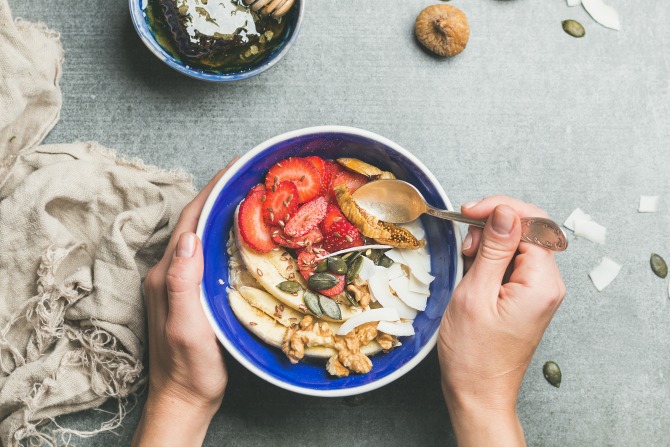You’ll never change your eating habits by just thinking about it

Posted on
Looking to change your eating habits?
As easy as it seems to sign up to an online program, download a meal plan or hook yourself up with a new app, one thing is for sure: the majority of people find it hard to consistently stick to a healthy eating pattern long term.
The truth is, dietary change is hard because, at its core, long term dietary change is behavioural change. If you started exploring all the reasons why you eat what you eat, you would discover that it has nearly everything to do with your daily habits and routines.
I’ll give you an example: Most weeks I’ll meet a client whose life looks like this:
- busy job
- partner with a demanding job
- lots of commitments outside of work
- 5-10 kilos overweight
- feeling tried and sluggish
- wants to lose weight and be more active
- struggles to stick to diets
- overeats in the afternoons and evenings: sweet treats, crackers and cheese, wine
When I conduct a dietary history with this person, it’s discovered that they rarely eat breakfast. They just grab a coffee. In fact, they grab multiple coffees across the day and get by with a small, rushed lunch. They’re weight conscious, so they try not to eat too much during the day. However, by 4 pm they’re starving, tired and over it. They just grab whatever food they can find as soon as they walk in the door at night. After dinner, there’s chores to be done, emails to write and Netflix to watch. Hubby’s eating ice cream on the couch. They may as well have a bowl along with him.
If they can get some healthy, whole foods into their body through the day, it’ll help them better manage their appetite and get in control of those afternoon and evening snacks.
I highlight a number of key areas where they could make improvements to their diet:
- Eat a filling breakfast
- Include more protein and vegetables at lunch
- Eat a healthy, satisfying afternoon snack
- Reduce snacks after dinner
I like to focus on one habit at a time. That way my clients don’t get overwhelmed with trying to eat ‘perfect’ for the whole day. The first habit we talk about is eating a filling breakfast. We chat about breakfast ideas that they can make, based on their food preferences, which offer plenty of nutrition and feel easy for them to prepare.
They leave my office feeling pumped (I’m a pretty fun and inspiring nutritionist!). They’re going to nail breakfast this week. Motivation is high.
The next morning rolls around…
The alarm goes off.
Argh… They’ve had a bad sleep. There’s lots on their mind. They feel tired and snooze the alarm multiple times before getting out of bed. They shower, get dressed, fix their hair.
Shit! It’s now 7.50am. If they don’t leave now the Canberra traffic will be unbearable! No time for breakfast today. Dang it. Try again tomorrow.
The next morning rolls around…
The alarm is snoozed multiple times.
They shower, get dressed and do their hair. It’s 7.40am. Yes! I’ve got 10 minutes to make breakfast.
Shit! Where is the list of breakfast options that Kate gave me? I don’t want to get them wrong, what’s the point of having breakfast if I don’t get it perfect?
Try again tomorrow.
The next morning rolls around…
They roll over well rested and stretch. What a great sleep.
Look at the clock: 7.30am. WTF? Alarm hasn’t gone off.
Shower, dress and the 2 min messy bun is smashed out. They definitely don’t have time for breakfast. Too hard today.
In fact, this whole breakfast thing is too hard. They Google “I don’t have time for breakfast’ and find some bullshit article on fasting in the mornings. They try that for the rest of the week. They continue to struggle with night time snacking and overeating.
They catch up with me for their next session: “I can’t eat breakfast. I just can’t.”
I am empathetic, nonjudgmental and encouraging. I’ll also challenge them to think about the word ‘can’t‘.
And this is what I’d say if you said you couldn’t’ do something that you knew was healthy for you: “Is it that you can’t? Or did you just think about doing a new healthy behaviour but not actually do anything different to make it happen?”
You see, if you want to change your eating habits, you’re going to have to change some other habits as well
For the breakfast behaviour to become a reality you might need to:
- wake up earlier,
- prep your breakfast the night before
- start work later or
- get to work earlier and eat breakfast at work before you start
Regardless of what solution you choose, you’ve got to take action. You’ve got to change your routine, to fit the new behaviour in. Otherwise, if you keep doing each day the same and your brain (which loves autopilot) will continue to repeat the same poor eating habits that you’ve always done.
Here are some key steps to making a new healthy behaviour stick:
- Clearly articulate what the new behaviour is.
- Write out all the steps that need to happen to make that new behaviour a reality.
- Practice each of those steps until you become familiar with the new routine.
- Don’t forget that you made need to tweak it with some trial and error. It doesn’t have to perfect first go, but you do need to take action and then refine that action until you find what works.
- Make sure that the nutrition advice that you’re following is realistic for you! If it’s too restrictive or doesn’t suit your food preferences, level of skill in the kitchen or isn’t how you’d want to eat for the rest of your life, get better advice!
My mission at The Healthy Eating Hub is to teach people how to consistently eat well for the rest of their life – by building habits, routines and skill that make healthy eating apart of who they are!


Leave a Reply
You must be logged in to post a comment.